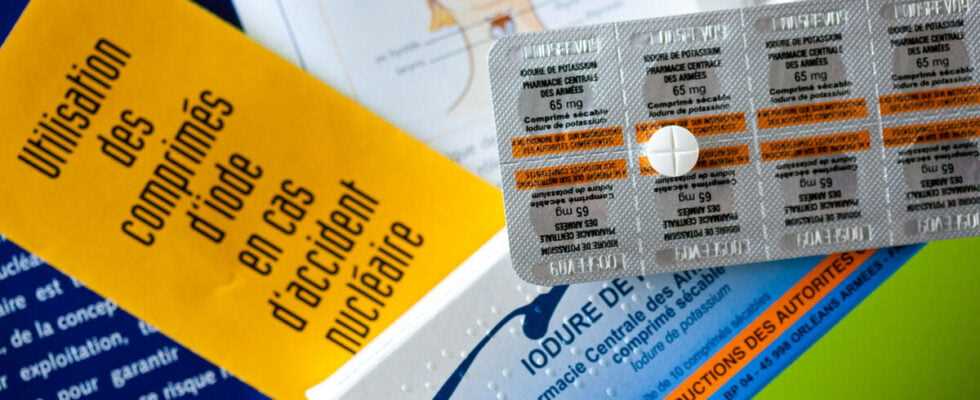The fighting near the Zaporijia power plant in Ukraine raises fears of radiation risks in some European countries. But trying to get iodine tablets is often useless. This self-medication, moreover, is not without risk.
The threat of “nuclear terrorgenerated by the worried Russian invasion beyond the Ukrainian borders. This is evidenced by the increase in sales of iodine tablets in Austria, Croatia, Luxembourg and Belgium in particular. On Thursday morning, Belgian pharmacies sold more than 56,000 boxes of iodine, said the spokesperson for the Belgian Pharmaceutical Association. In France, some pharmacies are also seeing a growing demand for these pills. And searches on Google with the keywords “nuclear accident iodine pellet” or “iodine against radioactivity” are also on the rise. Supposed to prevent thyroid cancer in the event of radioactive iodine emissions, the absorption of these pellets is not without risk.
Is there a nuclear risk after the fire at the Zaporizhia power plant?
Zaporizhia, the largest nuclear power plant in Europe, located in the south-east of Ukraine, was hit overnight from Thursday to Friday by fire from the Russian army. If a fire, which affected a building devoted to training and a laboratory, was visible on video surveillance images broadcast live from the nuclear power plant, it was quickly brought under control. The Russian military eventually seized the site, with no change in radiation levels detected, according to the Ukrainian regulator. “Iand director of the plant said that nuclear safety is now guaranteed”said Oleksandr Staroukh, head of the military administration of the Zaporizhia region.
In addition, if the reactor buildings had been hit, the protection is such that it remains unlikely to cause a radioactive leak, explains the magazine. International Defense and Security on Twitter. “In short, it is absolutely possible for a reactor building to be gutted in the fighting. But that does not in itself mean that a reactor is destroyed, much more is needed. The incident nevertheless caused a stir beyond the borders of Ukraine.
Iodine, what is it?
This trace element essential to the functioning of the human body, once assimilated, quickly binds to the thyroid to produce hormones which act, for example, on the growth of cells and the organism. According to the National Agency for Food, Environmental and Occupational Health Safety, the daily needs of this element are 150 mcg for adults. The agency specifies that a “an excessive and regular intake of iodine can lead to thyroid dysfunctions but also certain adverse effects, in particular at the cardiac or renal level.” For its part, the mіnіѕtèrе of а Health аvеrtіt thе іоdurе dе роtаѕѕіum nе dоіt раѕ be utіlіѕ tіtrе tіtrе prevention, саr іl реut рrоvоquеr dеѕglе thе thyr dеѕ trоub.
Why take iodine in case of nuclear risk?
Stable iodine helps to “block” the entry of radioactive iodine into the body, considered to be one of the most carcinogenic elements released during a nuclear accident. Indeed, when breathed in, radioactive iodine quickly causes cellular lesions which lead to thyroid dysfunctions. The Ministry of the Interior points out that “Taking stable iodine tablets protects the thyroid from radioactive iodine that could be released into the environment. The thyroid will absorb the stable iodine until saturation, and will therefore no longer be able to assimilate the radioactive iodine which may possibly be inhaled or ingested”. And states that “these iodine tablets must be administered in an accidental situation and only on the instructions of the authorities”.
In addition, the Ministry of the Interior has organized, regularly since 1997, campaigns for the distribution of iodine pills for people who live or work near the 19 nuclear power stations. French, within a radius of 10 to 20 kilometers, for “to protect their thyroid in the event of an accidental release of radioactive iodine into the atmosphere”. For the rest of the population, the sale of these iodine tablets is extremely restricted and not everyone can obtain them. In the event of an accident, all means (television, radio, vehicles with loudspeakers, etc.) will be used to give instructions for taking iodine, under the responsibility of the prefect, notes the Institute for Radiation Protection and Nuclear Safety ( IRSN).
What are the limits of iodine?
While taking stable iodine is one of the three measures that the prefect can take in the event of a nuclear accident, along with sheltering and evacuating populations, this does not protect against other radioactive elements. potentially released during a nuclear accident. In addition, iodine must be taken no earlier than one hour before exposure to radioactivity, and no later than six to twelve hours after. Earlier, their effectiveness will be significantly reduced. Later, beyond 24 hours, their side effects are more serious than the expected benefits.
Moreover, iodine is only one of thousands of existing radionuclides, reports the magazine Science and Future. “It is not even certain that a military nuclear attack involves radioactive iodine,” against which the stable iodine tablet fights, indicates a spokesperson for the Nuclear Safety Authority. The nuclear incident originating from a power plant is, in fact, different from a military nuclear attack.
Can I get iodine?
IRSN indicates that iodine is not available over the counter in France. “Its distribution, placed under the responsibility of the prefects, is ensured at the level of the departments and regions. In the event of a release or a radioactive cloud, some communities will thus be able to choose to make this iodine available at the level of pharmacies, or even schools, town halls or other places.
